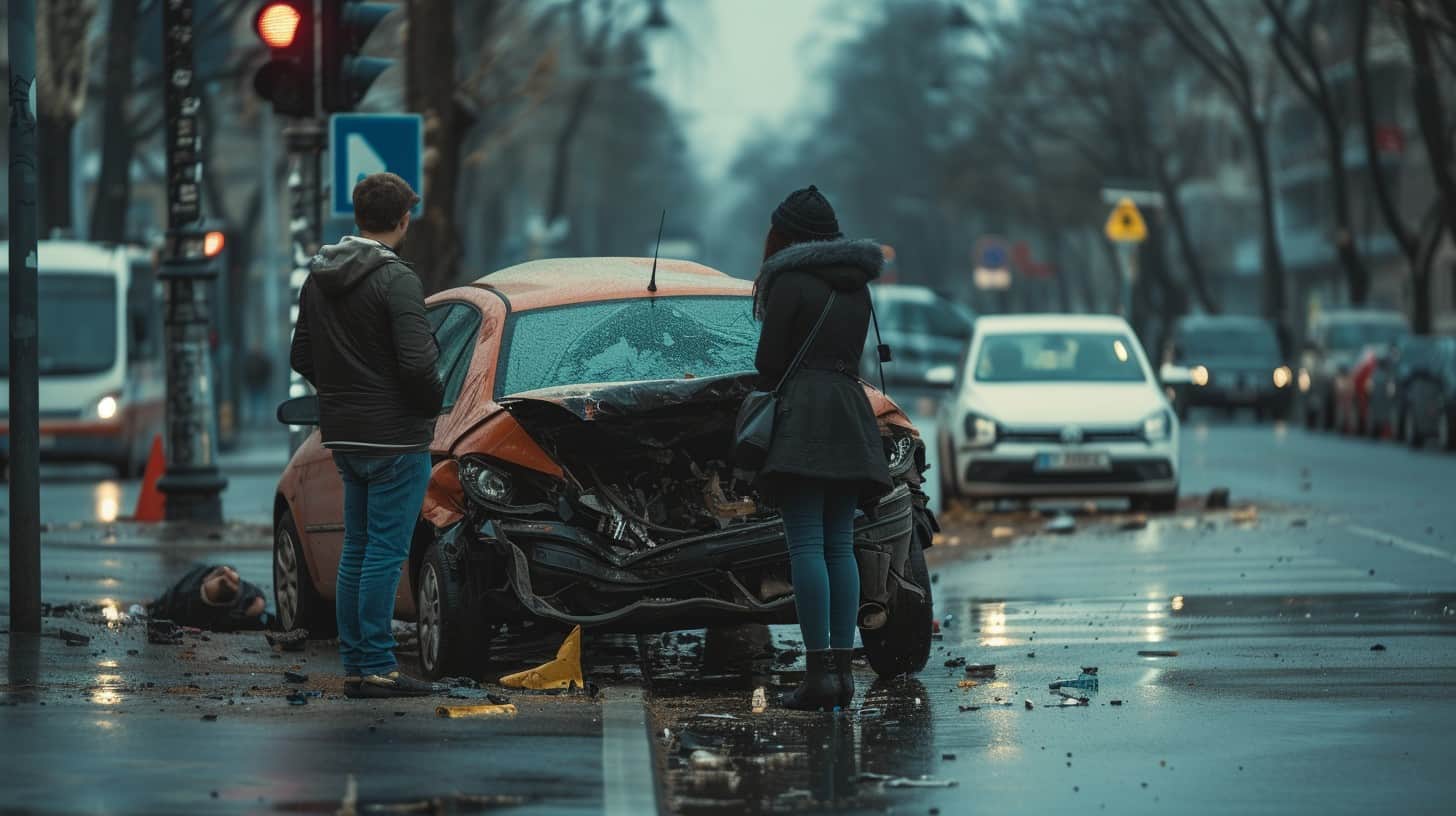We all know the drill—suddenly, there’s a jarring screech of metal on metal, and your routine day spins off course. Believe me; that sinking sensation is something I’m familiar with too.
It launched me into a deep dive to suss out the absolute “don’ts” after a car collision. So here’s an article brimming with essential tips to help you sidestep those pitfalls that can trip up your claim process like untied shoelaces.
Stick around—you’ll want these savvy pointers in your back pocket!
Key Takeaways
Never leave the scene of a car accident; it’s against the law and can hurt your insurance claim.
Always call 911 even for small bumps to get an official report, which helps later with insurance or in court.
Keep calm, don’t admit fault before talking to a lawyer, and document everything about the crash with photos and notes.
Tell your own insurance company about the accident fast, but watch what you say so it doesn’t damage your claim.
Get help from a car accident attorney to deal with legal things and make sure you get all the money you should.
Table of Contents
Common Mistakes After a Car Accident
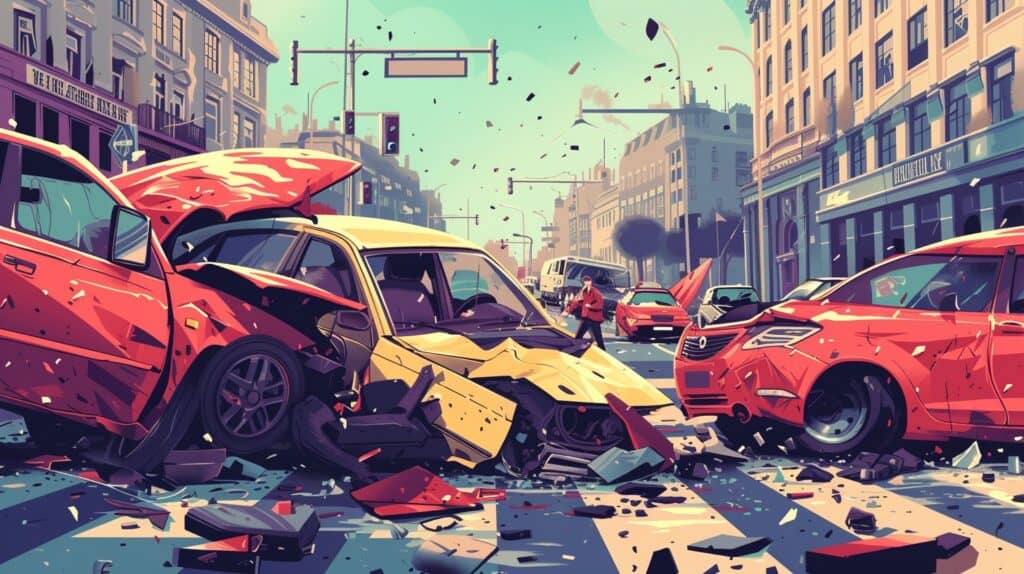
Hey guys, let’s talk about something that can really throw a wrench in your day—and potentially in your wallet—car accidents. Now, I’m not just talking about the crash itself; I mean those little slip-ups after the dust settles that can make a big difference when you’re dealing with medical insurance and legal stuff.
Sure, it might feel like chaos, but trust me, keeping your cool and avoiding some common blunders is key to making sure things don’t go from bad to worse. Let’s dive into what not to do so you can get through this with as little headache as possible—because who needs extra stress?
Leaving the Scene
I get it, accidents are scary. Your first thought might be to just drive off, especially if no one saw. But here’s the thing: leaving the scene is a big no-no. It can land you in really hot water with the law and mess up your chances of sorting things out smoothly with insurance later on.
Think I’m kidding? Trust me, I’m not. Driving away after an accident could mean hit-and-run charges – and that’s serious business. So even if it feels like bolting is the easiest option, take a deep breath and stay put.
You’ll thank yourself when it’s all said and done.
Forgetting to Call 911
It might seem like a small bump, and you think, “No big deal, we can sort this out.” But here’s the thing – always call 911. Sure, it feels easy to just exchange info with the other driver and be on your way.
However, getting the cops to come out and write up a police report is super important. It’s like having an official word on what went down.
You may feel okay right after the crash but trust me, some injuries sneak up on you later. That’s why getting police and medical folks involved from the get-go makes sense. They check everything out and make sure you’re really alright.
Plus, if things turn ugly with insurance or legal stuff down the road, that police report is like gold – it backs up your story with facts checked by law enforcement pros. So grab your phone and dial those three numbers; it’s better safe than sorry!
Losing Composure
Getting mad or upset after a car crash is easy. I’ve seen plenty of guys lose their cool, but that’s not the way to go. Yelling or blaming the other driver just makes things worse.
Take deep breaths and try to stay calm — it really helps when you need to explain what happened later on.
I know we men like to fix things fast, but rushing can lead us to miss important stuff. So, keep a clear head; don’t let anger or panic cloud your judgment. You’ll make better choices about what to do next — like getting pictures of the cars and finding people who saw the accident.
These actions are way smarter than losing your grip in a tense moment.
Neglecting to Document the Incident
I know how jumbled things can get after a car crash. You might forget to take pictures or jot down notes, but trust me, documenting everything is key. Here’s what you’ve got to remember:
- Grab your phone and snap photos of the cars, roads, and any injuries. Photos are your best pals when it comes to proving what went down.
- Jot down anything that seems off about the scene. It could be skid marks on the road or a broken stop sign – these details matter.
- Exchange info with the other driver – their name, insurance deets, and license plate number.
- Chat with witnesses and get their contact information. They might have seen something you missed!
- Use your phone to make a voice memo right there and then. Talk through what happened while it’s fresh in your head.
Admitting Fault Prematurely
Hey guys, I’ve got to talk about something important: saying “my bad” too soon after a car crash. If you say it was your fault right away, that can come back to bite you later. The other driver or their insurance folks could use your words against you.
Let’s be real—crashes are stressful. Sometimes we just want to smooth things over quickly. But if there are big risks and lots of money on the line, don’t rush into taking the blame.
It’s smarter to wait until an attorney is by your side before you start talking about who did what. Trust me, having a pro with you when dealing with the other driver’s insurance company makes a huge difference.
They’re like a shield that keeps trouble at bay while making sure everything is set straight—the right way.
Interactions with Insurance Companies
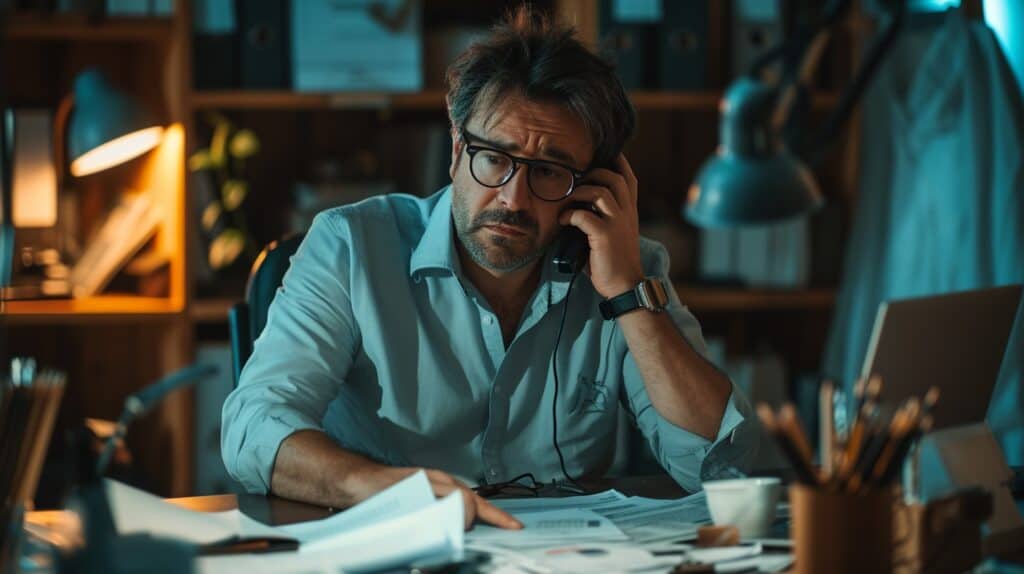
Ah, insurance companies – can’t live with ’em, can’t drive without ’em, right? Navigating these interactions post-accident is like stepping into a dance you never learned the moves to.
You want to cha-cha smoothly through your claim without missing a beat or stepping on any toes. So here’s the deal… when you’re facing off with the insurance adjuster, keep your cool and remember that anything you say might end up scribbled in their little notebook.
We’ll dive into why it’s crucial not to go solo and spill the beans to the other driver’s insurer, and how handling things with your own company requires a careful touch – think defusing a bomb instead of whacking a piñata.
Trust me; this isn’t the time for improvisation!
Speaking to the Other Driver’s Insurance Company Without Legal Representation
Look, you might feel like a quick chat with the other driver’s insurance company could clear things up. Don’t do it—trust me on this one. If you go in without legal backup, their insurance adjuster could twist your words and use them against you.
Those folks are pros at saving money for their company—not helping you get what’s fair.
Have a lawyer by your side before talking to them; they know the game inside out. Your attorney will handle the tough talks and protect your interests. So yeah, hold off on giving any statements or signing stuff until your lawyer gives the thumbs up—it’s just safer that way.
Failing to Report the Accident to Your Own Insurance Company
I got in a fender bender once and made the mistake of not telling my insurance right away. Big oops! If you don’t call them, they might say no to covering your car fix or medical bills.
It’s super important to report your traffic accident quickly so they can start working on it. You want everything smooth and fast, especially if your ride is a total loss or needs big repairs.
Next thing you know, without that quick call, you’re stuck waiting for ages to sort things out with property damage and costs. So grab that phone, dial up your insurance agent, and get the ball rolling.
Trust me; it’s worth those few minutes on the line. Now let’s talk about what happens if you give too much info to your own insurance company…
Providing a Written Statement to Your Insurance Company Without Caution
Hold on a second—writing to your insurance company seems easy, right? Not so fast! It’s like walking through a minefield. You want to tell them what happened, but you’ve got to be super careful with your words.
One wrong step and BOOM! Your claim could blow up in your face. The truth is, what you say can be used to figure out who’s at fault or even twist things around against you.
Here’s the deal: take it slow and think it through or, better yet, get some legal advice before you put pen to paper—or fingers to keyboard. A lawyer knows the game and will keep your story straight without giving away too much.
Just make sure every fact checks out; don’t just guess or assume stuff because that could backfire big time.
Okay, let’s switch gears now and talk about something else important – watching how we tackle legal matters after an accident.
Legal Considerations
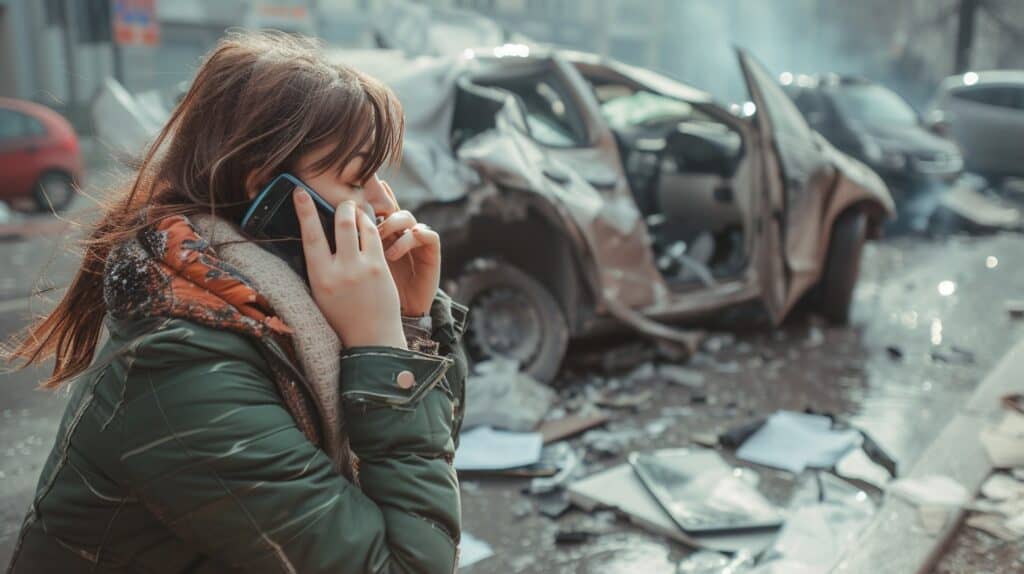
Hey, I get it—you’re not exactly thinking about courtrooms and legal briefs while you’re swapping insurance info on the side of the road. But trust me, a few smart moves in the legal department can save you loads of headaches later.
Like, ever tried to untangle spaghetti with a fork? Yeah, that’s what diving into legal stuff without knowing the ropes feels like.
So, here’s my two cents: Watch your step when it comes to anything law-related after an accident. Whether it’s shaking hands on a deal too soon or trying to be your own lawyer (spoiler alert: usually not a great idea), we’ll dive deeper into why keeping things above board—and getting savvy advice—can make all the difference in keeping things smooth and fair.
Stay tuned…
Entering into an Unfair Settlement Agreement
I know it can be tempting to just get the whole mess of a car accident behind us. We might think, “Let’s settle this and move on.” But rush into an unfair settlement agreement? That’s like jumping from the frying pan into the fire.
The deal may look good at first glance, but later you might find out it doesn’t cover all your auto repair bills or medical treatment.
Here’s where I messed up once—I didn’t call a car accident attorney before signing off on that dotted line. Trust me, they’re pros at making sure we don’t get shortchanged.
Getting legal advice isn’t just smart; it’s taking care of future-you.
Filing a Lawsuit on Your Own
Trying to handle a lawsuit by myself? Big mistake. I could miss important legal steps or mess up the paperwork. Plus, laws can be confusing and judges expect me to know them just like a lawyer does.
That’s why it’s smart to get help from a pro. A car accident lawyer knows all about personal injury cases, and they fight for folks like us every day.
Hey, no one wants to spend money if they don’t have to, right? But this is different—lawyers can often get more cash for my claim than I’d manage alone, even after their fees are paid.
Discussing the Accident with the Other Party Without Legal Advice
You might think it’s just being nice to chat with the other guy about what happened. But, be careful! Talking too much can hurt your claim later on. See, without a lawyer, you may say something that sounds like you’re taking the blame.
Even if you didn’t mean it that way. It’s tricky when emotions are high and everyone’s trying to figure out what went down.
So here’s what I do: keep it simple. Swap insurance details and wait for legal advice before getting into any heavy talks about the crash. That way, you won’t accidentally mess up your chance at a fair deal for fixing your car or covering medical bills.
Now let’s talk about why posting stuff online after an accident is not so smart..
Privacy Concerns
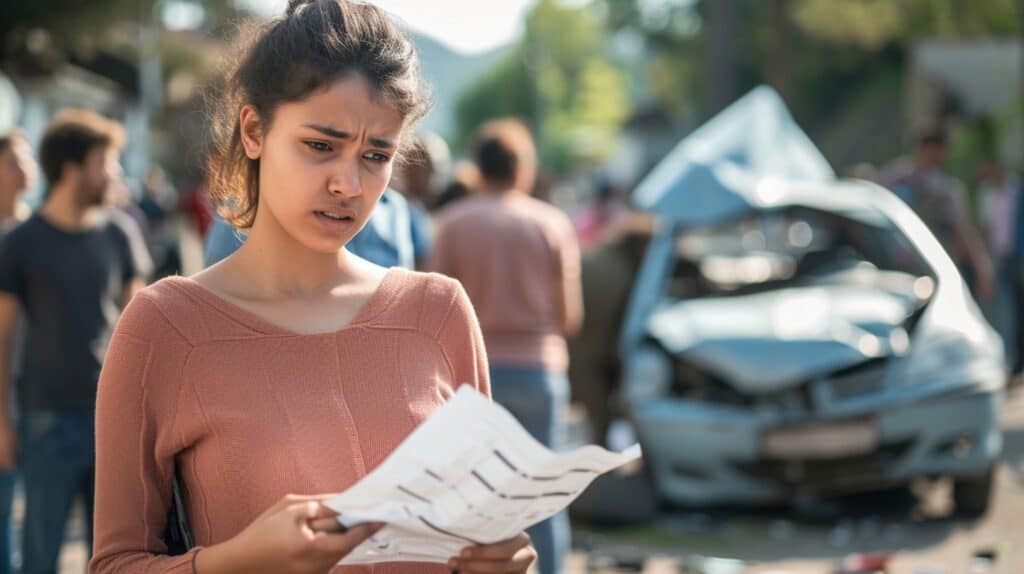
Alright, let’s talk about keeping your private life, well, private after a car crash – you’d be surprised how a simple Facebook post or tweet can really throw a wrench in your claims process; more on that little landmine later…
Keep reading, ’cause we’re diving into the dos and don’ts to make sure your claim sails smooth without any privacy blunders.
Allowing Unrestricted Access to Your Medical Records
So, you’ve been in a car crash. Tough break! One thing’s super important—keep your medical records under wraps unless it’s absolutely needed for the claim. Yeah, the insurance folks might ask to see them.
But guess what? They could use that info to wiggle out of paying by blaming pre-existing diseases or old injuries for your current pain.
You have every right to keep those details private until talking with a lawyer who knows how to handle them. Plus, if they get their hands on all your health history, they’ll be scrolling through looking for any reason not to pay up.
You wouldn’t hand over the keys to your diary, would you? Treat your medical records the same way, and only share what’s necessary when it’s time.
Posting Details about the Accident on Social Media
Hey, I get it. After a car crash, you might want to vent on social media or tell your friends what happened. But hold up! Posting about the accident can mess things up for you later.
Think about it—insurance folks and lawyers can see that stuff too. They might use your posts against you and say things didn’t happen like you said they did.
Keep that in mind before sharing photos or talking about who was at fault. You don’t want someone twisting your words, right? Better to keep those details between you and your lawyer—if you’ve got one—or at least until everything with the insurance is settled.
Now, let’s chat about seeking legal help.
Seeking Legal Assistance
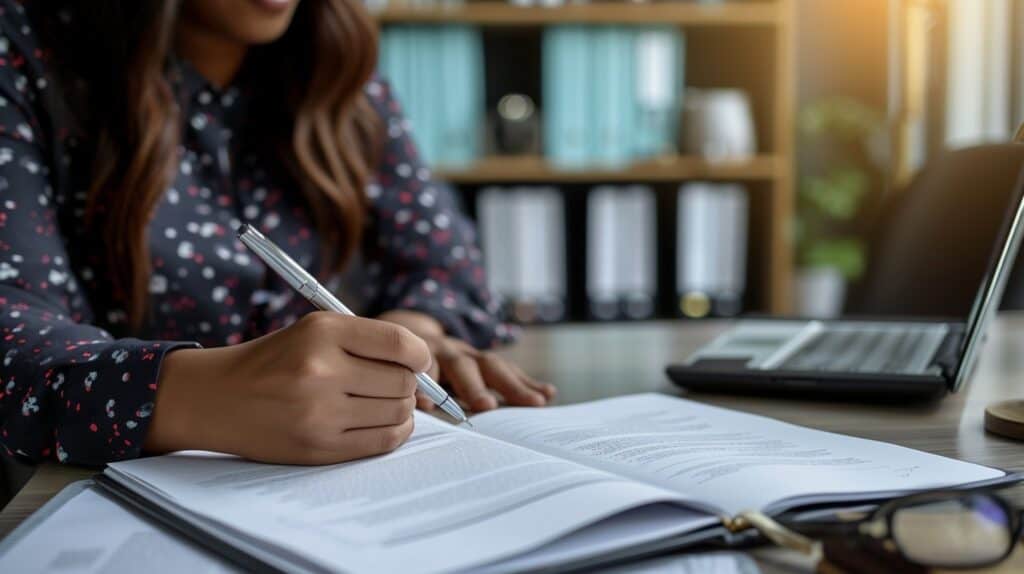
And let me tell ya, guys – skimping on a chat with a car accident attorney could leave your wallet feeling like it went through its own fender bender… So keep reading to get the full scoop on dodging those post-crash blunders.
Neglecting to Consult a Car Accident Attorney
I got in a car accident once. It’s easy to think you can handle everything yourself. But hey, it’s not just about fixing your car and getting back on the road. There are legal things to deal with too.
You might miss out if you don’t talk to a personal injury attorney.
So, I learned that talking to an attorney after my wreck was a smart move. They know all about claims and how insurance works. Without one, the insurance folks could give you less money than you should get.
A good lawyer fights for your rights and helps make sure you’re treated fair and square by everyone involved.
FAQs About What Not to Do After a Car Accident
What should I not do right after a car wreck?
Well, first off—don’t even think about leaving the scene! That’s a hit-and-run and could land you in big trouble, like felony-level trouble. And don’t just shake it off if you feel funny; your health comes first, so get checked out for things like whiplash or injuries that aren’t as obvious.
Should I always call the police after an auto accident?
Yes! Even if it seems minor, call them up. They’ll write a report and that’ll be solid gold proof when dealing with insurance folks later on.
Is it okay to just settle things with the other driver without insurance companies?
Hold your horses! Sure, keeping it between the two of ya sounds easy-peasy but trust me – bring in the insurance carrier. It’s their job to handle claims settlement and stuff like subrogation (fancy word for sorting out who pays what).
Can I just take my car to any repair shop?
You might want to… But hey, check this out – some insurers have preferred body shops they want you to use. They’ve done their homework, so those shops are likely top-notch.
Do I need all that paperwork—like vehicle registration and insurance info—at hand?
Absolutely! Think of ’em as your key players—you need ’em ready to go right from the get-go.
If another motorist caused damage and doesn’t have insurance, what do I do then?
Whoa, there—it’s time for uninsured motorist coverage to shine! This is why we pay those premiums; it covers our backs when someone else messes up and can’t cough up damages.
